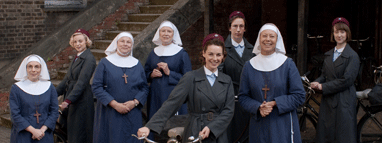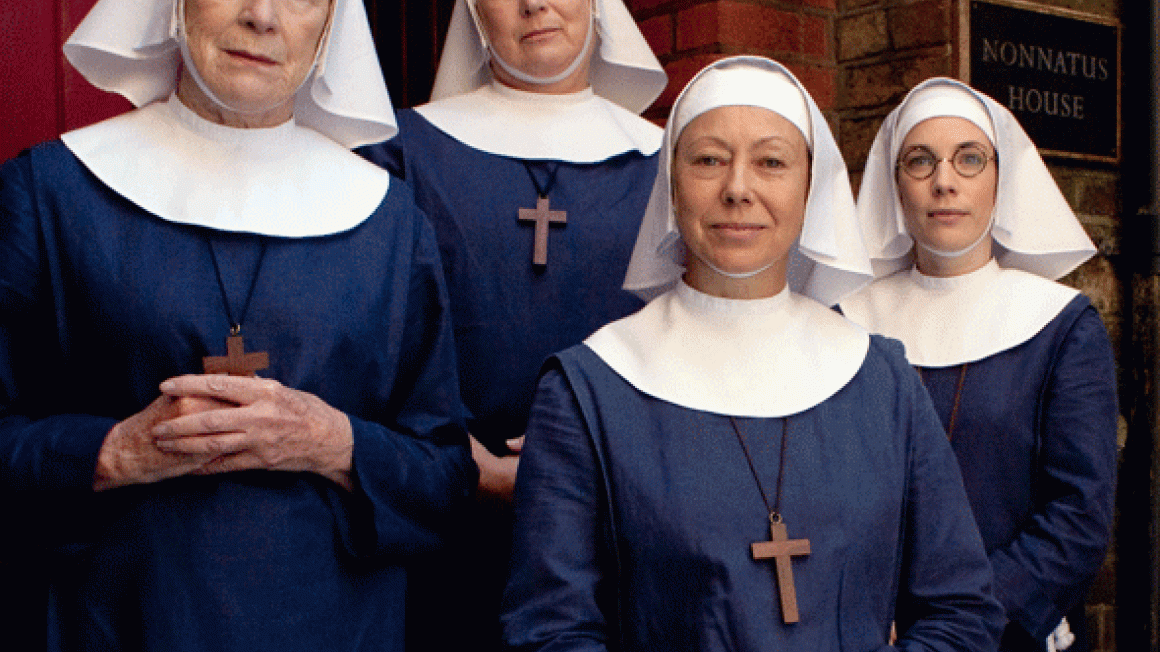How I got the HABIT
There is a responsibility playing a person who has lived, because you want to be as truthful as you can and present someone who might be recognised by family and friends. I hope I have served both; I have certainly enjoyed playing her.
The nuns at Nonnatus House are Anglican nuns and they are nursing sisters. What is foremost in their mind is looking after the community so they are very much a part of it, they are not at all reclusive. Seen through the eyes of the naive young heroine, Jenny (played by Jessica Raine), we discover how broad-minded they are. At one point, I say the line to her: You wear a uniform, we wear a habit – but we are both nurses and midwives first. And when things were difficult this was accepted as part and parcel of life. Where I might worry and go over things and re-examine character, she is engaged and interested but solitary, she's never going to have a partner or something that you can attach yourself to, and I guess that's what religion is for her. The real Sister Julienne and postcards to people. She must have been a hugely energetic woman who was fun to be around.
I hadn't read Jennifer's memoirs but I liked the idea of playing a character unlike anyone I have played before and I love the period it is set in. There was a big change between the 1950s and the 1960s. The 1950s was a more innocent time, people emerging from the war, re-assessing their values. They were discovering freedom but it was freedom in the context of having su ered the deprivations of war. With the 1960s and a new generation, the war was forgotten – suddenly everything really did change.
People's energy went into new things – discoveries in science, development and interest in the arts and music. There was the pill and the sexual liberation that came with it. I remember the 1960s quite well as a child – I don't remember the 1950s at all; discovering it now I am amazed by the people's fortitude and ability to start from scratch. I think there was such gratitude to be living in peace that responsibility and neighbourliness were more important than personal rights. Young people will be intrigued by this part of our history and those who remember the period will feel nostalgia for those more innocent times.
I just loved going through the 1950s newspapers. The women look so pristine and frocked and feminine. They've got neat, waved hair and trim waists – with big skirts – and they're in the kitchen in their pinafores doing the cooking and the men certainly aren't. It's the advertising that makes you realise how much has changed. Having said that, people are emotionally the same, it's only society that's changed; today we expect so much more, and make many more demands for a better quality of life.
Working with this cast is terrific. Pam Ferris is an absolute bundle of energy, and Judy Parfitt is great fun and very creative; I worked with her before a number of years ago and admire all she does.
A lot of humour comes out of the difficult moments. Miranda Hart's character comes from a frightfully posh background and is completely at odds with the people she works with and for, which is highly amusing. Cheryl Campbell plays her mother. I found it very difficult to keep a straight face in scenes together. Jessica Raine has a huge amount of theatre experience and it is lovely to see what she is bringing to the screen. Laura, Helen and Bryony are very different from one another but all very exciting actors. Each episode, different characters are introduced and they have been beautifully cast.
And I am enjoying not worrying about costumes, make-up or hair. Every day it's the same thing: hair scraped back, a bit of powder so as not to shine, but nothing else. My costume is thick black stockings and comfortable flat shoes, on with the habit, a cord tied at the waist with three knots at the end and then a cap and the wimple – all very freeing, but I am mindful not to swear, as it does seem shocking dressed as a nun.
I do wish I might have the sense of peace that seems to come with giving up a 'worldly existence'. The nuns' work as midwives, with their dedication to God, is totally fulfilling. I have huge respect for them but it would be impossible for me to lead their life. Perhaps I might learn to stop trying to change things I can't change; Sister Julienne is good at that. Working on the production has made me think about religion and spirituality. I wish I could take away with me the nuns' ability to be non-judgemental; there is great peace in accepting people as they are, and it certainly makes communication easier. I like the habit, but I don't think I'll take that away with me.

From left to right:
SISTER BERNADETTE: LAURA MAIN
Still in her 30s, she is closest in age to the secular midwives and has a fresh, uncomplicated approach to her work.
TRIXIE: HELEN GEORGE
A bright, glamorous girl in her mid-20s. All fully-fashioned nylons and lush red lipstick, Trixie loves jazz and dancing, smokes Sobranie cigarettes and is a bit of a fl irt.
SISTER EVANGELINA: PAM FERRIS
The only one of the sisters to come from the same tough background as the community the nuns serve. Physically vigorous, she has a robust sense of humour. However, her blunt speech often offends.
SISTER MONICA JOAN: JUDY PARFITT
Born into a leading titled family, Sister Monica was one of the first women in Britain to qualify as a midwife. In the closing years of the 19th century, this was seen as a radical act. Now in her 90s, she is retired from practice and lives at Nonnatus House.
JENNY: JESSICA RAINE
Nurse Jenny Lee arrives at Nonnatus House in 1957, aged 22 and completely unaware of the world she's about to enter. Believing she has accepted a job with a small private hospital, it comes as a surprise to her to discover she's moving into a convent.
'CHUMMY': MIRANDA HART
The daughter of a prominent family, she is stricken by shyness. She proves an adept midwife, but is hampered by a complete inability to ride a bike.
SISTER JULIENNE: JENNY AGUTTER
A strong-willed woman 'with a twinkle in her eye'.
CYNTHIA: BRYONY HANNAH
Caring, stoical and intelligent. Midwifery is a highly desirable alternative to dull domesticity that would otherwise be her only option.


